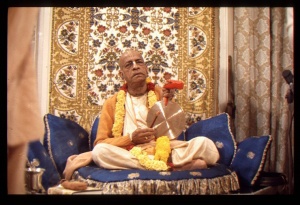SB 11.2.9

A.C. Bhaktivedanta Swami Prabhupada
Please note: The synonyms, translation and purport of this verse were composed by disciples of Śrīla Prabhupāda
TEXT 9
- yathā vicitra-vyasanād
- bhavadbhir viśvato-bhayāt
- mucyema hy añjasaivāddhā
- tathā naḥ śādhi su-vrata
SYNONYMS
yathā — so that; vicitra-vyasanāt — which is full of various dangers; bhavadbhiḥ — because of you; viśvataḥ-bhayāt — (from this material world) which is fearful everywhere; mucyema — I may be liberated; hi — indeed; añjasā — easily; eva — even; addhā — directly; tathā — thus; naḥ — us; śādhi — please instruct; su-vrata — O you who are always true to your vow.
Translation and purport composed by disciples of Śrīla Prabhupāda
TRANSLATION
My dear lord, you are always true to your vow. Please instruct me clearly, so that by your mercy I may easily free myself from material existence, which is full of many dangers and keeps us constantly bound in fear.
PURPORT
The word mucyema is significant here. In the previous verse Vasudeva stated that because he had been bewildered by the illusory energy of the Lord he could not achieve from the Supreme Personality of Godhead the boon of liberation. Therefore he is now approaching the pure devotee of the Lord, confident that by the mercy of the Lord's devotee he will certainly achieve liberation from material bondage.
In this connection the words añjasā, "easily," and addhā, "directly," are very important. Although foolish persons proudly want to jump up directly to the Supreme Personality of Godhead without accepting His pure devotee as spiritual master, those who are experienced in spiritual science know that by submission and service at the lotus feet of a pure devotee one directly contacts the Supreme Personality of Godhead. In the Śrīmad-Bhāgavatam (SB 11.17.27) Lord Kṛṣṇa has stated, ācāryaṁ māṁ vijānīyān nāvamanyeta karhicit. Thus one should understand that the pure devotee of Kṛṣṇa stands on the same spiritual level as the Lord Himself. This does not mean that a pure devotee is also God, but because of his intimate loving connection with the Lord, he is accepted by the Lord as being the Lord's very soul. In other words, Kṛṣṇa is always in the heart of His pure devotee, and the pure devotee is always in the heart of Kṛṣṇa. Although Śrī Kṛṣṇa is eternally the Supreme Personality of Godhead, one without a second, the Lord is more pleased to see His pure devotee worshiped. Therefore the Lord says, ācāryaṁ māṁ vijānīyāt. One must offer the same respect to the Vaiṣṇava spiritual master as one would offer to the Lord. Therefore as soon as one pleases the Vaiṣṇava spiritual master, one immediately pleases Kṛṣṇa and makes spiritual advancement. The word añjasā means that this bona fide process is the easiest method of achieving spiritual perfection. And because the pure devotee is a transparent medium, the word addhā, "directly," is used, indicating that service rendered to the pure devotee goes directly to the lotus feet of Kṛṣṇa, whereas service one whimsically offers to Kṛṣṇa directly, bypassing the bona fide spiritual master, is not actually accepted and is therefore useless.
Those who actually desire the highest perfection, that of going back home, back to the eternal, blissful kingdom of Kṛṣṇa, should study very carefully the example shown by Śrī Vasudeva in these two verses. He indicates that although one cannot achieve liberation by directly worshiping the Supreme Personality of Godhead, one can very easily achieve the perfection of life simply by a moment's association with a pure devotee of Lord Kṛṣṇa such as Nārada Muni, the exalted Vaiṣṇava saint among the demigods.
According to Śrīla Jīva Gosvāmī, the word viśvato-bhayāt indicates that Vasudeva very much feared the curse of the brāhmaṇas. As one can become perfect by worshiping the Vaiṣṇavas, by displeasing the Vaiṣṇavas one can bring about all misfortune. Thus Vasudeva feared the curse delivered by the brāhmaṇas at Piṇḍāraka-tīrtha.